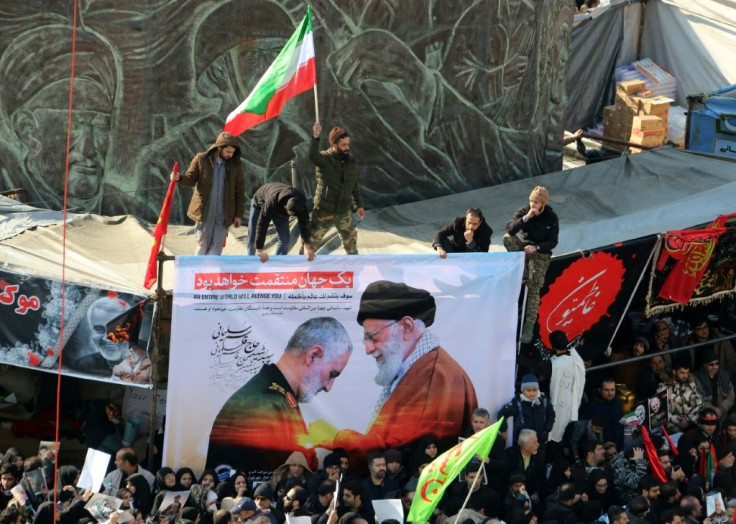Monday's Stock Market Open: US Equities Open Lower On Continued Middle East Turmoil, Oil Nears $70

KEY POINTS
- Trump vowed to slap sanctions on Iraq if it expels foreign troops
- China, which is heavily dependent on Middle East oil, called for calm
- Brent crude oil futures hit $70
U.S. stocks turned mixed, recovering from earlier lows, despite continued fears of a wider conflict in the Middle East in the wake of last week's airstrike in Baghdad which killed Iranian Gen. Qassem Soleimani.
The Dow Jones Industrial Average dropped 62.69 points to 28,572.19 while the S&P 500 fell 2.09 points to 3,232.76 and the Nasdaq Composite Index rose 10.17 points to 9030.94.
Crude oil futures were up 0.19% at $63.17 per barrel and Brent crude rose 0.45% at $68.91. Gold futures gained 0.89%.
President Donald Trump said on Sunday that he may hit Iraq with heavy sanctions after Parliament passed a resolution calling for the expulsion of foreign troops. “We have a very extraordinarily expensive airbase that’s there. It cost billions of dollars to build. Long before my time. We’re not leaving unless they pay us back for it,” Trump said.
Iran also said that in retaliation for the killing of Soleimani, it will abandon the uranium-enrichment limits established by the 2015 nuclear deal. On Monday, Trump tweeted that Iran will never gain nuclear weapons.
Secretary of State Mike Pompeo warned on Sunday the U.S. military could strike more Iranian leaders if Teheran retaliates for the killing of Soleimani.
“Clearly geopolitical risks are negatively impacting equity prices,” said Terry Sandven, chief equity strategist for U.S. Bank Wealth Management. “It’s reason for equities to trend off some, until markets get greater visibility in terms of what the next sequence of events will be in that region.”
China has called for all parties to remain calm. Chinese Foreign Minister Wang Yi reportedly spoke on Saturday to his Iranian counterpart Mohammad Javad Zarif.
“China opposes the use of force in international relations,” Yi said. “Military means will lead nowhere. Maximum pressure won’t work either. China urges the U.S. to seek resolutions through dialogue instead of abusing force. China will continue to uphold an objective and just position and play a constructive role in safeguarding peace and security in the Gulf region of the Middle East.”
“Everyone got comfortable in that fact that the truce in the [U.S.-China] trade war had come through and the outlook for 2020 looked a little bit better, and then we had another geopolitical reminder [Iran] come through,” said Peter Dragicevich, Suncorp Group’s financial market strategist. “It’s going to be a big driver of markets in the short term.”
However, Ed Yardeni, president and chief investment strategist at Yardeni Research, said in a note: “Our outlook remains optimistic and bullish. Geopolitical crises tend to create buying opportunities in the stock market as long as they don’t trigger a recession. We don’t believe that Iran will disrupt oil supplies significantly now that the U.S. has demonstrated a willingness to use lethal force to deter Iran’s mischief-making in the Middle East.”
Similarly, Stephen Innes, chief market strategist at AxiTrader noted that “U.S. equity markets tend to rally whenever the U.S. begins military operations overseas.” He added that “the fundamental backdrop for stocks remains positive."
On Sunday New York Fed President John Williams said the U.S. Federal Reserve needs to adhere to its 2% inflation target even in a climate of low interest rates.
“There’s been a process of going through the stages of grief about a low neutral rate,” Williams said. “These factors are basically the hand we’ve been dealt for the next five to 10 years. If inflation continues to underrun our target levels like it has, this downward trend in inflation expectations will likely continue with inflation expectations falling well below target levels.”
The IHS Markit Services Purchasing Managers' Index final estimate for December improved to 52.8 from 52.2 in the prior estimate and 51.6 in November.
"Business activity in the vast service sector picked up pace at the end of last year as rising domestic demand and signs of reviving exports led to higher workloads," said Chris Williamson, chief business economist at IHS Markit. "Combined with indications of manufacturing lifting out of its recent lull, the survey data suggest the overall pace of economic growth accelerated to its fastest since last April."
Overnight in Asia, markets finished lower. China’s Shanghai Composite slipped 0.01%, while Hong Kong’s Hang Seng fell 0.79%, but Japan’s Nikkei-225 dropped 1.91%.
In Europe markets finished lower, but recovered from earlier lows, with Britain’s FTSE-100 down 0.75%, France’s CAC-40 fell 0.54% and Germany’s DAX dropped 0.76%
The euro rose 0.26% at $1.1188 while the pound sterling gained 0.67% at $1.3168.
© Copyright IBTimes 2025. All rights reserved.





















